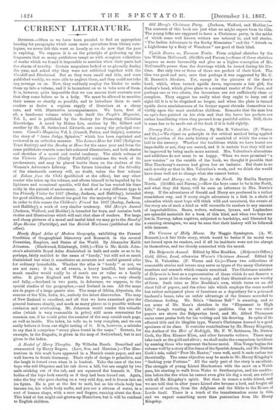The Belgravia Annual. Edited by Miss Madden. (Belgravia0ifice.) Golcl, Silver,
Lead, otherwise 1Varne's Christmas Annual. Edited by Mrs. R. Valentine. (F. Warne and Co.)—These two collections of seasonable stories and verses may serve as types of the many Christmas numbers and annuals which remain unnoticed. The Christmas number of Belgravia is best as a representative of those which do not deserve a notice ; most of its stories are trashy, and their illustrations are worthy of them. Such tales as Miss Braddon's own, which turns on an old chest full of papers, and the other tale which employs the same useful but rather antiquated piece of furniture as a depositary for a poisoned husband's bones, take an unfair advantage of the licence accorded to Christmas fooling. Mr. Sale's "Serious Ball" is amusing, and so are some of Mr. Ross's sketches in the "Elopement in High Life," though wanting in all artistic qualities. One or two other papers are above the Belgravian level, and Mr. Alfred Thompson earns some praise both for his writing and his drawing. In spite of its affected title and its illegible type, Warne's Christmas Annual is a good specimen of its class. It contains contributions by Mr. Henry Kingsley, the Author of the Heir of Reciclee, Mr. F. W. Robinson, Mr. Dutton Cook, the Hon. Eleanor Eden, and other favourite writers. These may take rank as the gold and silver ; we shall make the comparison invidious by naming those who represent the baser metal. Miss Tongs begins the volume well by a story of the times of the Spanish Armada, and Mr. Dutton Cook's tale, called " Poor Mr. Baxter," runs well, until it ends rather too theatrically. The same objection may be made to Mr. Henry Kingsley's "Seeking your Fortune." All the early part of the story is excellent. The struggle of young Lionel Blackestone with the snow on a Welsh pass, his starting to walk from Wales to Southampton, and his medita- tion before the fire when he cannot even give his dog a meal, are related with all Mr. Kingaley's spirit. But then in comes a noble friend, and we are told that in after years Lionel also became a lord, and fought all manner of nations, from the Afghans and the Sikhs to the House of Lords itself. There is a touch of the transformation scene in this, and we expect something more than pantomime from Mr. Henry Kingsley.






































 Previous page
Previous page